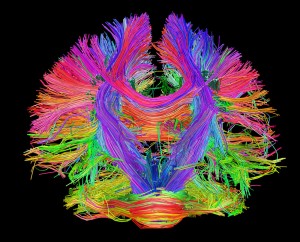Oct
24
2008
Yesterday I wrote about the Wedge strategy of the intelligent design (ID) movement – namely to undermine and replace the materialist basis of modern science with something that conforms to their ideological spiritual beliefs. This anti-materialist agenda has been primarily targeted against evolution, but now seems to be shifting its attention to neuroscience.
An Unholy Alliance
The Wedge strategy of the Discovery Institute (DI) and other ID proponents is largely a Christian movement. It is interesting that they have found common ground with others who have a very different ideology but share in common a distaste for strict materialism because it is inconvenient to their spiritual agenda.
Continue Reading »
Oct
23
2008
The New Scientist has recently discovered what readers of this blog have known for a while – that the denial of materialist neuroscience is the “new creationism.” In fact I have written extensively over the past year about the embrace by the Discovery Institute (an intelligent design group) of cartesian dualism, the notion that the mind is a different substance from the brain. The primary proponent of this argument for the DI (and a frequent foil of my blog entries) is Michael Egnor, a creationist neurosurgeon. But the New Scientist article correctly points out that this is actually part of a larger movement and a larger strategy.
The Wedge Strategy
This current attack on neuroscience has the same underlying roots as the ID attack on evolution – the real enemy for ID proponents is materialism. The infamous Wedge document makes this clear in its opening paragraphs:
The proposition that human beings are created in the image of God is one of the bedrock principles on which Western civilization was built. Its influence can be detected in most, if not all, of the West’s greatest achievements, including representative democracy, human rights, free enterprise, and progress in the arts and sciences.
Yet a little over a century ago, this cardinal idea came under wholesale attack by intellectuals drawing on the discoveries of modern science. Debunking the traditional conceptions of both God and man, thinkers such as Charles Darwin, Karl Marx, and Sigmund Freud portrayed humans not as moral and spiritual beings, but as animals or machines who inhabited a universe ruled by purely impersonal forces and whose behavior and very thoughts were dictated by the unbending forces of biology, chemistry, and environment. This materialistic conception of reality eventually infected virtually every area of our culture, from politics and economics to literature and art.
Continue Reading »
Jun
05
2007
Michael Egnor, the neurosurgeon who has made a series of embarrassingly ridiculous claims about evolution and intelligent design (ID), now has turned his sights on consciousness and materialism. Actually, he is revealing the true underlying beef that ID proponents/creationists have with modern science – methodological materialism. It’s really just whining about scientists not letting supernaturalism play in their sandbox. They fail to recognize (or care) that methodological materialism is not just an arbitrary choice. Rather, supernaturalism won’t fit in science’s sandbox – the two are fundamentally incompatible.
Egnor has chosen as his latest topic that of human consciousness. This is a favorite topic for the woo crowd, and it is interesting that the fundamentalist Christians, who traditionally are at ideological odds with new age and occult beliefs, are finding common ground over consciousness. It is not a surprise as the phenomenon of consciousness is poorly understood and even more difficult to articulate, and pseudoscience thrives in the fertile ground at the edges of current scientific knowledge (witness the other favorite woo topic of quantum mechanics).
Egnor writes:
“There is no shared property yet identified by science through which brain matter can cause mental acts like altruism. Material substances have mass and energy. Ideas have purpose and judgment. There is no commonality. The association between brain function and ideas is fascinating, and the association of ideas with regions of the brain is a proper object of scientific study. But where there is no commonality of properties, association cannot be causation. Ideas must be caused by substances that have properties common to ideas- such as purpose and judgment.
“Materialist neuroscientists confuse association with causation.”
This is utter rubbish on many levels. Egnor’s basic point is that the material brain cannot cause mental activity, which is immaterial. But he does not establish that premise, he merely assumes it and his justification is nothing more than semantics. He then accuses material scientists of assuming that mental functions are brain functions, while essentially dismissing a huge chunk of modern neuroscience as “interesting” but irrelevant by falsely invoking the “correlation is not causation” argument.
Continue Reading »
Aug
08
2022
 One of the many unintended consequences of social media is what is popularly referred to as FOMO – fear of missing out. People see all the wonderful things people are doing and buying in their social media profiles, and fear that they are missing out on the good life, or the latest trend, or perhaps some investment opportunity. This is the social media equivalent of “keeping up with the Joneses”. FOMO results from a basic human psychological tendency, to determine our own happiness by comparing ourselves to some relative standard, whether that’s our neighbors, our social group, or what we see on TV or on people’s Facebook pages.
One of the many unintended consequences of social media is what is popularly referred to as FOMO – fear of missing out. People see all the wonderful things people are doing and buying in their social media profiles, and fear that they are missing out on the good life, or the latest trend, or perhaps some investment opportunity. This is the social media equivalent of “keeping up with the Joneses”. FOMO results from a basic human psychological tendency, to determine our own happiness by comparing ourselves to some relative standard, whether that’s our neighbors, our social group, or what we see on TV or on people’s Facebook pages.
This phenomenon also interacts with another, that we determine our happiness relative to our own current state, meaning that we habituate to our current situation. Functionally what this means is that if we want to remain happy we constantly need more – more than we have now, and more that other people have. The habituation phenomenon was humorously depicted in the video game, Portal 2 (an excellent game, highly recommended if you like video games). The main antagonist is an AI that is programmed to run the player through various testing scenarios. Each time the player completes a test the AI gets the silicon version of a dose of dopamine, but the digital Nirvana is short-lived and it has to run another test to maintain the good feeling. But it rapidly habituates to this feedback, with shorter and less intense reward meaning it has to test faster and harder.
This is essentially how humans function as well. We are never content. We cannot remain happy by standing still. We need whatever other people have, and we need more than we currently have. This lines up with research into happiness. Making more money does make people happier, up to the level where basic needs and security are met (in the US this is now about 75k per year). Some researchers frame this not as money making people happy, but rather not having enough money to meet basic needs is stressful and makes people unhappy. Beyond this basic level, increasing income does not correlate with happiness. Whether you make 75 thousand a year or 75 million a year does not matter. Further, everyone thinks that they would be happy if they just made 20% more than they currently make – regardless of how much that is. We habituate to our current situation and then think we need a little more to be happy.
Continue Reading »
May
12
2017
 I honestly don’t care what people choose to believe about unknowable speculations outside the realm of science and human knowledge. As long as they don’t use such belief as justification for public policy or to infringe on the rights of others, believe whatever you want.
I honestly don’t care what people choose to believe about unknowable speculations outside the realm of science and human knowledge. As long as they don’t use such belief as justification for public policy or to infringe on the rights of others, believe whatever you want.
However, once someone claims that they have scientific evidence for a supernatural belief, or can prove such a belief logically, then they have stepped into the arena of logic and science and their claims can be examined.
One such claim is that the existence of God can be proven through various logical arguments. I have never seen such an argument that I found even slightly compelling. They all have gaping holes in their logic. The latest incarnation comes from Robert Nelson, who appears to be promoting his 2015 book, “God? Very Probably.” He claims to have five rational arguments that lead to the conclusion that God very probably exists. Let’s take a look. Continue Reading »
Sep
24
2015
 This week I have been making my way through a list of old and debunked creationist arguments put together by Michael Snyder (a young-earth creationist), giving the old arguments new life on social media. As science communicators we often have to play this game of whack-a-mole, persistently addressing points that have already been refuted. Each time is an opportunity to educate more people about the real science of evolution, about logic and critical thinking, about science in general, and the vacuous and deceptive arguments of the science deniers.
This week I have been making my way through a list of old and debunked creationist arguments put together by Michael Snyder (a young-earth creationist), giving the old arguments new life on social media. As science communicators we often have to play this game of whack-a-mole, persistently addressing points that have already been refuted. Each time is an opportunity to educate more people about the real science of evolution, about logic and critical thinking, about science in general, and the vacuous and deceptive arguments of the science deniers.
This is the fourth and final installment of this series of posts. You can find the others here: Part I, Part II, and Part III.
The next five points that Snyder raises are all variations on the same theme:
#30 Which evolved first: blood, the heart, or the blood vessels for the blood to travel through?
#31 Which evolved first: the mouth, the stomach, the digestive fluids, or the ability to poop?
#32 Which evolved first: the windpipe, the lungs, or the ability of the body to use oxygen?
#33 Which evolved first: the bones, ligaments, tendons, blood supply, or the muscles to move the bones?
#34 In order for blood to clot, more than 20 complex steps need to successfully be completed. How in the world did that process possibly evolve?
Snyder, of course, is asking a false question, one with an unstated major premise that is wrong, or at least misleading. The implication he is trying to make is essentially the debunked notion of irreducible complexity – that complex structures or biological systems could not have evolved because they could not have simpler functional states.
Continue Reading »
Dec
16
2014
 It has been six years since I have written a blog post deconstructing the nonsense of our favorite creationist neurosurgeon, Michael Egnor. In case you have forgotten, he is a dualist writing for the intelligent design propaganda blog, Evolution News and Views. He delights in ridiculing what he calls “materialist metaphysics,” or what scientists call, “science.”
It has been six years since I have written a blog post deconstructing the nonsense of our favorite creationist neurosurgeon, Michael Egnor. In case you have forgotten, he is a dualist writing for the intelligent design propaganda blog, Evolution News and Views. He delights in ridiculing what he calls “materialist metaphysics,” or what scientists call, “science.”
I guess I shouldn’t be surprised that he has managed to outdo his prior incoherent ramblings. In a recent blog post he claims that it is impossible for the brain to store memories, an idea he ridicules as “nonsense.”
As usual, Egnor is playing loose with definitions and logic, tying himself up in a conceptual knot in order to arrive at his desired destination – the idea that the brain cannot account for mental phenomena. His logic train derails pretty quickly:
It has been known for the better part of a century that certain structures in the brain are associated with memory. The amygdala and the hippocampus in the temporal lobe, and some adjacent cortical regions, have been shown to be associated with the act of remembering in animals and humans.
Continue Reading »
Nov
12
2013
As promised, Deepak Chopra has written a follow up article about what he calls The Rise and Fall of Militant Skepticism. As we saw in part 1, Chopra remains consistent with his reputation for being intellectually superficial and careless, more interested in propping up his particular brand of mysticism than genuinely engaging with his critics.
In part 2 Chopra also continues his practice of erecting massive strawmen, consistent with the narrative standard in his corner of the wooniverse. He begins by once again conflating atheism with skepticism. Clearly he did not read or comprehend any of the skeptical responses to his first post. Now he trots out the tired claim that skeptics are negative and want to kill curiosity – it’s all just so tedious.
He also uses a strategy that I see increasingly within the subculture of many pseudosciences, specifically trying to adopt the language of skeptics but turning that language back against skeptics, as if they thought of in the first place.
Continue Reading »
May
13
2013
On the SGU this week we did an interview with Don McLeroy, the former chairman of the Texas School Board of Education, famous for his (successful) attempts to insert wording into the science textbook standards that would open the door for creationist arguments.
The interview was very enlightening. In my opinion it was an excellent example of the power of motivated reasoning – if we have a conclusion in mind, people are very good at finding a mental path to get there.
We rarely do confrontational interviews on the SGU, but the few we have done I am generally happy with. The risk is that the tone of the interview will go sour. I have only done such interviews when I feel that the person being interviewed will be able to stay calm and professional even as we dismantle their position. Another risk is that the interviewee, who likely is a passionate and eloquent defender of their fringe position, will make it difficult to get a word in edgewise, resulting in a Gish Gallop.
Continue Reading »
May
17
2012
I hadn’t planned for this topic to take over my blog this week, but it happens. Judging by the comments there is significant interest in the issue of consciousness, and Kastrup and I are just getting to the real nub of the argument. So here is another installment – a reply to Kastrup’s latest offering. First, however, some background.
Materialism, Dualism, and Idealism
Philosophers of mind, such as David Chalmers, now recognize three general approaches to the question – what is consciousness? Materialism is the view that the mind is what the brain does. This is often stated as the mind is caused by the brain. Some commenters took exception to this phrase, saying it implies a dualist position, that the mind is its own thing, but I disagree. The brain is the physical substance, while the mind or consciousness is a process that emerges from the brain. A dead or deeply comatose brain has no mind, so they are manifestly not the same thing. Language here is a bit imprecise, but I think the phrase – the brain causes the mind – is an acceptable short hand for the materialist position.
Dualism is the position that consciousness is something separate from the brain and not entirely caused by it. It may be a separate property of the universe (property dualism) or be something beyond the confines of our material universe. Whatever it is, it does not reduce to the firing of neurons in the brain, which cannot, in the opinion of dualists, explain subjective experience.
Continue Reading »

 One of the many unintended consequences of social media is what is popularly referred to as FOMO – fear of missing out. People see all the wonderful things people are doing and buying in their social media profiles, and fear that they are missing out on the good life, or the latest trend, or perhaps some investment opportunity. This is the social media equivalent of “keeping up with the Joneses”. FOMO results from a basic human psychological tendency, to determine our own happiness by comparing ourselves to some relative standard, whether that’s our neighbors, our social group, or what we see on TV or on people’s Facebook pages.
One of the many unintended consequences of social media is what is popularly referred to as FOMO – fear of missing out. People see all the wonderful things people are doing and buying in their social media profiles, and fear that they are missing out on the good life, or the latest trend, or perhaps some investment opportunity. This is the social media equivalent of “keeping up with the Joneses”. FOMO results from a basic human psychological tendency, to determine our own happiness by comparing ourselves to some relative standard, whether that’s our neighbors, our social group, or what we see on TV or on people’s Facebook pages. I honestly don’t care what people choose to believe about unknowable speculations outside the realm of science and human knowledge. As long as they don’t use such belief as justification for public policy or to infringe on the rights of others, believe whatever you want.
I honestly don’t care what people choose to believe about unknowable speculations outside the realm of science and human knowledge. As long as they don’t use such belief as justification for public policy or to infringe on the rights of others, believe whatever you want.






